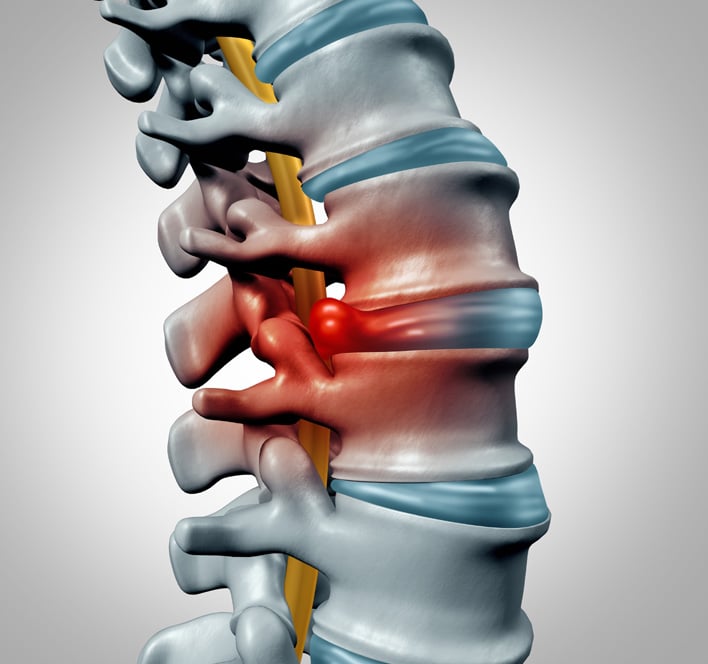Herniated and bulging discs are two disorders that often contribute to spinal cord-related pain, such as back pain. While these terms are frequently used interchangeably, they refer to distinct spinal conditions with unique characteristics.
For a proper diagnosis and successful treatment, you’d want to understand the differences between bulging and herniated discs. You’ll also be able to make an informed decision when you know which is which you’re suffering from. The skilled team at NJ Spine & Orthopedic can help you understand what you need to know and get you the treatment you deserve.
What Are Spinal Discs?
Spinal discs are soft, circular structures between your vertebrae. They support and separate one spinal column from the adjacent one. Vertebrae discs crucially act as cushions or shock absorbers that promote flexibility, mobility, and spinal column protection.
The discs crucially maintain the spine’s stability, flexibility, and range of motion. They also protect the spinal cord and nerve roots from excessive stress and impact during movement. Unfortunately, spinal discs can be subject to degenerative changes, usually due to age, injuries, or conditions such as herniation or bulging, which can cause pain, discomfort, and other spinal problems.
What Is a Bulging Disc?
When a disc in the spine swells past its normal limit, it is called a bulging disc. With age and normal wear and tear, the discs may weaken and lose elasticity, leading to bulging.
A bulging disc usually does not always cause noticeable symptoms, and it may be discovered incidentally during imaging tests. However, when the bulge compresses nearby nerves or spinal structures, it can result in the following symptoms:
- Localized pain
- Tingling
- Numbness
- Weakness in the affected area
Treatment for a protruding disc focuses on relieving pain, reducing inflammation, and improving spinal stability. Non-surgical treatments like physical therapy, chiropractic adjustments, and pain relief methods are the first in line before considering other options.
In severe cases where conservative treatments fail, a spine specialist may consider minimally-invasive surgical options like spinal fusion.
What Is a Herniated Disc?
When the inner core of the intervertebral disc protrudes through the outer ring, the disc is said to be herniated. This condition often arises due to age-related degeneration, trauma, or repetitive strain on the spine. A herniated disc typically presents with symptoms like:
- Intense localized or radiating pain
- Numbness
- Tingling
- Muscle weakness
Treatment for a herniated disc aims to alleviate pain, reduce inflammation, and promote healing. Similar to bulging discs, non-surgical interventions are attempted first. In some cases, epidural steroid injections may be administered to provide temporary relief. If conservative treatments fail to alleviate your symptoms, your surgeon may recommend surgical interventions.
What Are the Key Differences Between a Bulging Disc and a Herniated Disc?
While a bulging disc and a herniated disc share similarities, there are distinct differences between the two conditions. Key disparities include:
- A bulging disc occurs when the outer disc segment weakens and protrudes outside its normal position, but the inner core remains intact. In contrast, a herniated disc involves a rupture or tear in the outer ring, allowing the inner core to protrude.
- A bulging disc often causes localized pain and discomfort, while a herniated disc may lead to intense pain, numbness, and muscle weakness due to nerve compression
- A bulging disc may go unnoticed for a while until symptoms worsen, while a herniated disc usually manifests in acute pain quickly
- The most frequent type of disc damage is bulging, whereas a herniated disc is less frequent
One thing to remember regarding these two conditions is that they can occur anywhere along the spine, which, if left untreated or undiagnosed, can worsen. A diagnosis should be straightforward with the proper physical exams and MRI testing, getting you the care you need quickly.
Speak With an Expert Spine Surgeon Today
Are you experiencing back pain or suspect you have a spinal condition such as a bulging or herniated disc? If the answer is yes, we recommend you consult a trusted medical spine and orthopedic specialist for an accurate diagnosis and appropriate treatment.
NJ Spine & Orthopedic is a renowned medical center specializing in spine care and orthopedic treatments. We offer thorough assessments of spinal health and various treatment choices thanks to our staff of skilled spine doctors and cutting-edge, modern, minimally invasive techniques. Call us today at (866) 553-0612 or schedule a consultation online to connect with our experienced specialists who can guide you on your journey to a pain-free life. Our Concierge Team can also help coordinate your journey every step of the way.

